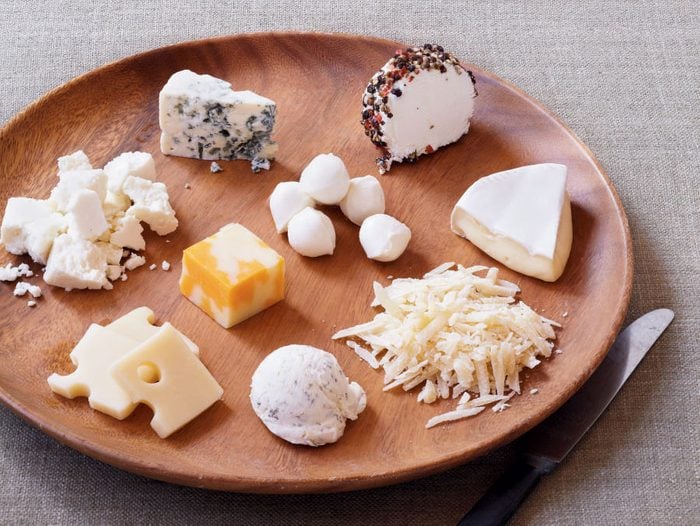
Curious About the Calories in Cheese?
Sure, cheese is good for you (it’s packed with protein and has vitamins and minerals, too), but too much of it is not. Canada’s Food Guide says that 50 grams of cheese counts as one full serving of milk or milk alternatives—you should get just two servings a day. What’s more, cheese can also have a lot of calories, and those fat grams can add up fast, too.
Help keep portions in check with our guide to what 100 calories looks like for a variety of cheeses. (This cheese infograph can also help.)

100 Calories of Marble Cheese
This pairs nicely with an apple slice, as marbled cheddar has a sharp taste that balances nicely with fruit. Bonus: vitamin A, riboflavin, calcium, zinc, phosphorus and selenium.
100 calories = one 25-g serving (8 g fat)
(Related: 6 Lower-Calorie Options for People Who Love Cheese)

100 Calories of Camembert
Warm this cheese to room temperature and spread on crackers or a crusty baguette. You can also eat the soft rind. Bonus: riboflavin, vitamin B12, as well as calcium, zinc, phosphorus and selenium.
100 calories = one 33-g serving (8 g fat)

100 Calories of Cream Cheese
This is a mouthwatering treat of subtle-flavoured cheese when served with warmed pita slices (baked in the oven, not pan-fried). Bonus: vitamin A, choline, calcium and phosphorus.
100 calories = one 29-g serving (10 g fat)
(Looking for a treat? Try our Healthy Parsnip Cupcakes With Cream Cheese Yogurt Frosting.)

100 Calories of Feta Cheese
This tangy cheese, which can be eaten on its own or crumbled over a salad or pizza, enhances the flavour of Sauvignon Blanc wine. Bonus: riboflavin, vitamins B6 and B12, calcium, phosphorus, zinc and selenium.
100 calories = one 38-g serving (8 g fat)

100 Calories of Bocconcini
This mozzarella cheese is very mild in flavour and goes well with stronger foods, such as prosciutto and basil. Bonus: calcium, phosphorus, and selenium.
100 calories = one 33-g serving (7 g fat)

100 Calories of Parmesan Cheese
This hard, salty cheese, often grated over pasta, adds a sharp note of flavour to a pear wedge. Bonus: riboflavin, vitamin B12, calcium, phosphorus and selenium.
100 calories = one 25-g serving (7 g fat)
(Want to take a break from cheese? Try our Vegan Eggplant Parmesan.)

100 Calories of Roquefort/Blue
This flavourful “blue” cheese hails from France and is typically made of sheep’s milk. Bonus: vitamin A, riboflavin, calcium, phosphorus and selenium.
100 calories = one 27-g serving (8 g fat)

100 Calories of Chevre
This light-flavoured cheese has a bit of bite without being too overpowering. Create a quick amuse bouche with a cherry tomato slice and shallot pieces. Bonus: vitamin A, riboflavin, phosphorus and copper.
100 calories = one 37-g serving (8 g fat)

100 Calories of Swiss Cheese
A platter staple, Swiss cheese is aged longer than other types, so it’s got a sweeter taste than most cheeses. Bonus: vitamin B12, calcium, phosphorus, zinc and selenium.
100 calories = one 26-g serving (8 g fat)
Next, check out a chef’s secrets to building a stunning cheese platter.
